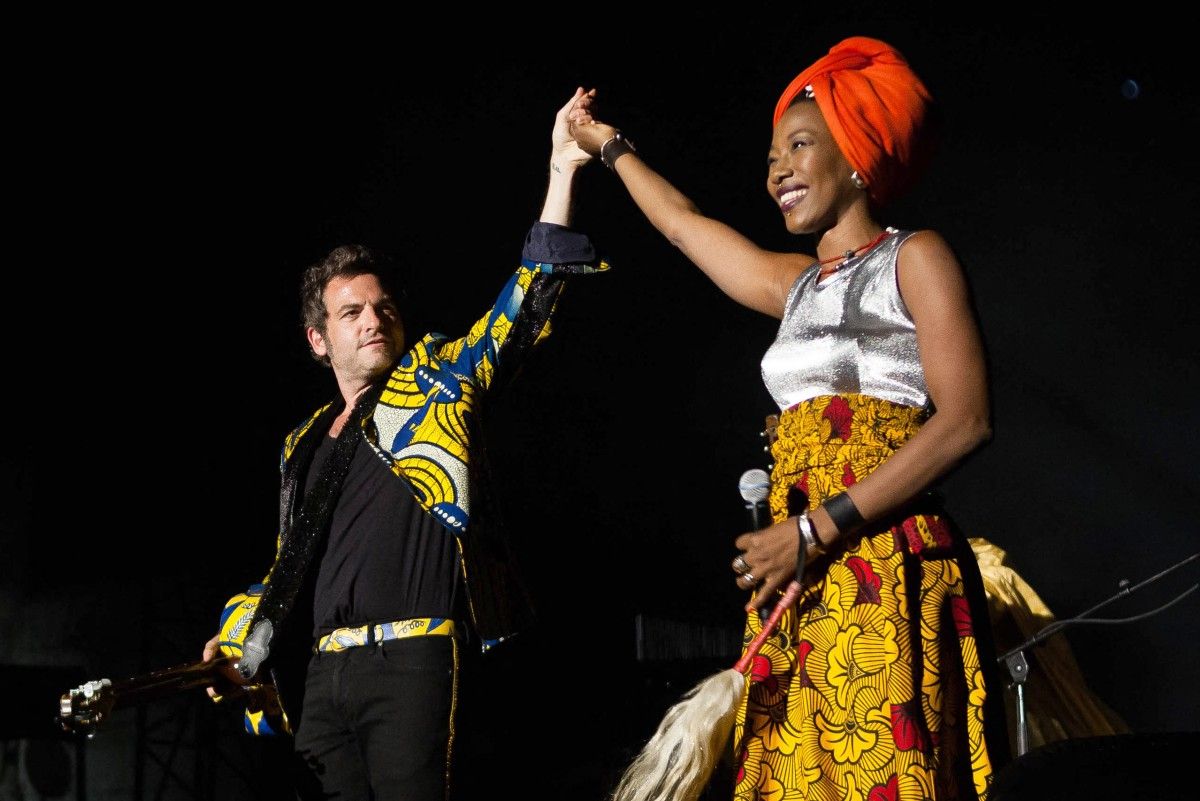
Eight years after the success of the first album, Matthieu Chedid returns with Lamomali Totem, an Afro-pop tribute to the late Toumani Diabaté. A vibrant and collective project that celebrates Mali’s spirit amid turbulent times.
Sequels? Not really his thing. “Stuff like Rocky II freaks me out, the idea of repeating the same thing.” And yet, eight years after blending voices and sounds from Mali into a groundbreaking choral album, -M- is back at the helm of a new Lamomali.
“At first, I wasn’t into it at all. I thought doing a pale imitation would’ve been a disaster,” says French singer-guitarist Matthieu Chedid in an interview with AFP. Eventually, a greater force convinced him to dive in.
“Inspiration is stronger than we are,” he reflects from his Paris home studio, where he and Malian singer Fatoumata Diawara created the first Lamomali, a major hit in 2017 with over 300,000 copies sold.
The new release, Lamomali Totem, owes much to the gentle persistence of Malian music legend Toumani Diabaté, who had already blended the strings of his kora with -M- on the original album, alongside artists like Youssou N’Dour, Jain, and Seu Jorge.
“If I had listened to my cautious, Western instincts, I probably wouldn’t have gone for a second album,” admits -M-. “But it was much bigger than that. The desire came straight from Mali.” And from Toumani.
“Matthieu was chosen because he’s the white griot,” jokes Fatoumata Diawara, who co-wrote several tracks. “In Mali, music is passed down through griot families, from father to son—kind of like the Chedids.”
“Grab Your Guitars”
It was back in 2015 in Bamako that -M- first met Toumani Diabaté and dared to cross the musical border between France and Mali.
“I would’ve never dared to ‘popify’ the kora,” he says. “I have too much respect for that music. But it was Toumani who told me, ‘Go on, Matthieu, bring your guitars.’”
For Lamomali Totem, -M- embraced that Afro-pop blend once again, this time with rising star Yamê, Patrick Watson, and Angélique Kidjo. But Toumani Diabaté never got to hear the final tracks—he passed away suddenly in July 2024 at age 58.
“He was supposed to come hear the recordings two weeks later,” recalls Chedid. “I hadn’t sent him anything—I wanted it to be a surprise…”
The album also includes the last recorded kora notes from Toumani Diabaté and the final guitar riffs from Amadou Bagayoko—one half of the duo Amadou & Mariam—who passed away in early April. “A rare soul and an extraordinary guitarist,” says -M-.
Other departed friends—musician Philippe Zdar and producer Marc-Antoine Moreau, who discovered Amadou & Mariam—also haunt this deeply emotional, almost testamentary Totem. And yet, it bursts with rhythm and celebration.
“Being explosive and radiant is really important to us,” says -M-. “That’s the message we want to send to the world.” And to the stage, where the Lamomali collective will tour this summer, wrapping with two dates in Paris in December.
The album may be uplifting, but -M- is fully aware of the storms Mali has weathered since the first Lamomali. The country went through two coups in 2020 and 2021, and still faces frequent jihadist attacks.
“There are geopolitical realities, sure—but we’re here to shine a light on the beauty of this country and its culture, without ever turning a blind eye,” he explains.
One track, Il neige à Bamako (It’s Snowing in Bamako), captures his fear of never seeing the Malian capital again, paired with a flicker of hope: “Will I see Bamako again? / The hangouts, the motorbikes / Dreaming is already something.”
The new Lamomali presents itself as an antidote to despair, embracing love—even if it risks sounding cliché.
“Giving love is the hardest thing,” says Fatoumata Diawara. “People don’t just do it easily, and it’s up to us, as artists, to remind them: you can share, you can give, and it doesn’t make you weak.”
With AFP



Comments